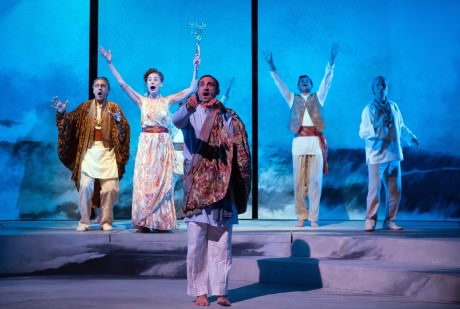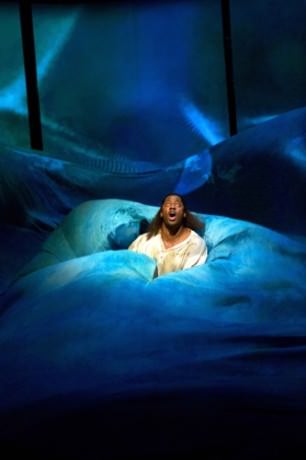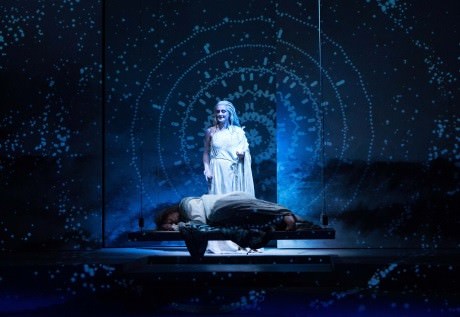The rarely performed Pericles by William Shakespeare, now on stage at Folger Theatre, is that even rarer of manuscripts: a folk play with epic plot, with virtuous storytelling and song, and without a hint of psychology.

In these troubled times, Pericles and its simple, uplifting tale, is just what the dramatist ordered. May it have full houses for as far as the eye can see.
In our currently academy, MFA-dominated cultural milieu, it’s easy to understand why this play gets short changed, despite the fact that early scenes might have been written by a collaborator, George Wilkins. Pericles violates all the “rules” of contemporary playwriting and cultural sensitivities.
In its opening scene we meet Pericles, Prince of Tyre, played by the highly versatile Wayne T. Carr. He has decided to woo the voluptuous daughter (Jennie Greenberry) of King Antiochus (Scott Ripley). To do so, he must answer a riddle devised by Antiochus; failing to do so correctly, however, will mean his death.

Unfortunately, answering correctly will also mean his death; for the answer to the riddle reveals the incestuous relationship that the sinister Antiochus has with his daughter.
Figuring out the riddle, Pericles must stall for time, which will give him a chance to flee. He does so and Antiochus sends an assassin after him.
We never meet Antiochus nor his daughter again, however, as the play’s plot goes to sea following the adventures of its hero, Pericles.
Such plot structures do not reflect academic training, not that any of Shakespeare’s rowdy plays ever reflect the academy and its culturally acceptable motifs and genres.
Pericles’ plot does, however, provide an opportunity for a marvelous story of love, family, and redemption, plus ample moments for a scenography worthy of long memory.
Mr. Carr’s Pericles covers the gambit of human emotions, moving from shy teenager to loving father to despairing elder, and all in the spirit of adventure and good fun.
The tale is told with wisdom and clarity by Gower (Armando Durán), employing the first of many songs, with music and lyrics by Jack Herrick.
An ensemble of 14 actors plays a host of wonderful characters, each either adorable or wickedly fun, or somewhere oddly in between.
Michael J. Hume, Cedric Lamar, and U. Jonathan Toppo play a trio of clownish fishermen who rescue Pericles after one of many perilous sea journeys. The image of their song and dance will linger long after the evening has finished.
Speaking of clownishness and song, Mr. Hume also plays a whorish Bawd who turns the definition of “woman of the evening” on its proverbial head.
As will a pair of hilarious pirates who rescue Pericles’ daughter from the hands of certain death (unlike in Hamlet, where pirates rescue of the title’s desperate hero off-stage and in between acts). Played by Barzin Akhavan and Samuel L. Wick, these pirates sound and look just like you’d expect pirates to sound and look, and it’s great.
Speaking of Pericles’ daughter, Marina, played as well by Jennie Greenberry, her beautiful voice and sensitive, yet commanding presence absorbs the audience’s attention.
Marina’s mother, Thaisa, is performed by Brooke Parks. Ms. Parks gives the character a loving, joyful presence that fills the theatre with smiles.
Zlato Rizziolli (Lord/Sailor), Emily Serdahl (Lychoriada/Diana), and Darcy Danielson (Musician) round out the ensemble with a trio of fine performances of numerous characters.
Joseph Haj directs Pericles, and he does so with a fine grasp of multiple styles. By allowing the production to move freely among farce and romance and, even on occasion, into drama, Haj allows the audience to feel for the characters, not only their rousing determination but also their deep sorrow and authentic rebirth.

This diverse emotional palette is what makes this Pericles such a joy to experience.
The excellent production team deserves a standing ovation. Raquel Barreto’s costumes are a visual delight. They also allow for a quick identification of the characters.
Jan Chamber’s scenic design is stellar, as are the sound and video design by Amadon Jaeger and Francesca Talenti respectively. As a team they take the audience not only out to sea but on occasion immerse them in it, swallowed by the waves and buoyed by the swells.
It’s Jack Herrick’s lyrics and music that deserve the most praise, however, for they capture the folksy nature of the play to the letter, laying down a lyrical structure that the plot then rides from sea crest to sea crest all the way home to its glorious conclusion.
And that’s the real reason why you should see this Pericles: no matter what happens and no matter how dark the day gets or hopeless the night, the next wave can truly bring in a new treasure.
So see Oregon Shakespeare Festival’s production of Pericles, now at the Folger Theatre, at the Folger Shakespeare Library—201 East Capitol Street, SE, in Washington, DC.

For information or tickets, call the box office at (202) 544-7077, or purchase them online.




